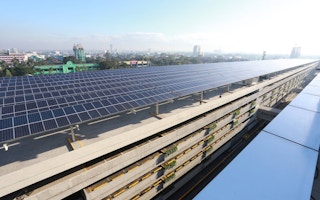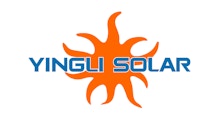Solar panels stamped with “Made in China” labels often struggle to overcome perceptions that they are low quality and unreliable, due partly to reports in recent years of such modules bursting into flames or failing as soon as two years after installation.
No thanks to fierce competition and falling module prices in the global solar market, Chinese solar manufacturers have been accused of using cheap, untested materials and cutting corners in the production process.
Among the Chinese solar firms, however, one company has differentiated itself by publicly declaring its commitment to quality - and is putting their money where their mouth is.
Yingli Solar, the world’s largest solar panel manufacturer by number of modules, says its investment in quality and technology has helped it clinch numerous accolades in the industry, including the market’s “most preferred PV brand globally”, by a 2014 customer insight survey by American market research company IHS.
Yingli says it subjects its solar panels to rigorous ‘marathon testing’ that is far beyond the requirement of industry regulations.
Speaking to Eco-Business in a recent interview, Angie Koh, Yingli Solar’s managing director for Southeast Asia, says that the company’s founder, Miao Liansheng, had a vision to “change the perception of Chinese manufacturing as low-cost and low-quality”.
When Miao, 58, set up Yingli in Baoding, China, in 1998, “he wanted Yingli to be the first name that springs to mind when people talk about quality products from China,” she explains. It is this ambition that guides the company’s focus on quality and research and development.
Not all solar panels are made equal
In a fast-growing global market that will grow from US$67 billion in 2013 to US$137 billion by 2020 according to Frost and Sullivan, solar panels vary widely in their physical durability and energy yield.
The ability of panels - an investment that has to last 25 years - to withstand high temperatures and humidity levels are of particular concern to customers in Asia, says Koh.
Every component of Yingli’s panels – the frames that support the panels, the glass covering, the ‘glue’ (or ethylene-vinyl acetate) that binds the panels together, the solar cells themselves, the backsheets which the panel rests on, and various electrical connectors - undergoes rigorous quality testing to ensure that they deliver on both durability and energy yield, she adds.
The panel frames, for example, are designed in-house to withstand corrosion in humid environments, while the protective backsheets are made with the same polyvinyl fluoride film that NASA uses in its rocket ships.
Yingli’s panels conform to industry standards issued by the International Electrotechnical Commission (IEC), but they are also put through voluntary ‘marathon tests’, which are much more stringent than the IEC’s requirements.
These tests are conducted by several testing and certification companies worldwide, each to slightly different standards and requirements.
For example, global testing and certification providers TUV SUD conduct a “Thresher” reliability test to assess how panels perform in extreme temperatures and humidity levels over a prolonged period of time, among other factors.
Alexander Krenz, Greater China PV quality manager TUV SUD, tells Eco-Business that “‘Thresher’ testing lends a unique selling point to manufacturers wanting to prove that they are better than others and provides a higher level of product lifetime confidence to buyers”.
The high-intensity tests also reveal safety and performance degradation patterns in how the physical components and capacity of modules degrade over time, says Krenz, adding that this has the added benefit of giving companies insights into how their components and production processes can be further improved.
Investing in innovation
Yingli’s vertically integrated model of doing everything in-house – from the first step of producing the raw polysilicon used in solar cells to the final stage of module assembly – helps them control the quality and cost of its panels, notes Koh.
“Vertical integration also spurs innovation by allowing us to identify ways to make our processes more efficient,” she adds.
One such innovation has been the ‘Panda’ solar panel, which Yingli brought to market in early 2011. This model produces up to 10 per cent more power than other panels, thanks to the use of phosphorous, rather than boron, to treat the silicon so that it conducts electricity.
Named after Yingli’s vice president Jingfeng Xiong, whose surname means ‘bear’ in Mandarin and who spearheaded the Panda project, the panels were developed by the Energy Research Center of the Netherlands (ECN) and American semiconductor firm Amtech Systems, with Yingi providing the expertise to manufacture this new technology at scale.
“Panda panels have a higher up-front cost and similar payback period compared to conventional panels,” says Koh. “But because of the higher efficiency, customers reap more profits after the payback period.”
Investing in quality has several other pay-offs too, says Koh.
For one thing, strict quality control at every stage of manufacturing reduces the wastage that would result from discarding inferior or faulty goods.
“We are able to pass these cost savings on to customers, who benefit from better quality products without paying much more,” says Koh.
These efforts have helped Yingli Solar become the top Chinese brand in international solar panel performance competitions, such as the German testing laboratory Photon’s annual outdoor energy-yield test. In 2012, for example, Yingli ranked fifth among 151 panel manufacturers.
In the same year, the company’s Panda panels ranked second among 14 manufacturers a similar test conducted by certification company TUV Rheinland.
The reliability of Yingli’s panels also help build customer loyalty.
In Singapore, for example, clean energy firm Rezeca Renewables supplies only Yingli Solar’s panels to its clientele in the residential and commercial sectors.
Zachary Wang, general manager of Rezeca, says Yingli’s panels are chosen because “they always deliver more power than they promise, and the quality and materials used in panel construction are very good”.
In 2009, when the company was set up and exploring potential suppliers for its solar business, “Yingli was not the cheapest option,” recalls Wang. “But it was the most cost-effective option in terms of panel quality.”
Rezeca installs between 40 and 60 residential projects a year, with each one ranging from about 5 kilowatts (KW) to 40KW in installed capacity.
“We have had no customer complaints about any of the systems we have built so far,” says Wang.
As the solar market races ahead, Yingli is expecting a surge in demand for its panels.
“Our management constantly grapples with being able to meet this growing demand, but that is a good problem to have,” says Koh. “But we will definitely not enter a price war or compromise on the quality and reputation of our panels.”


















